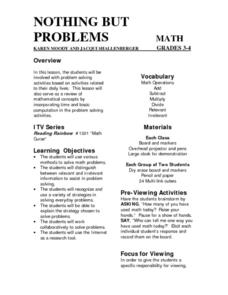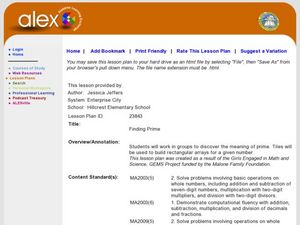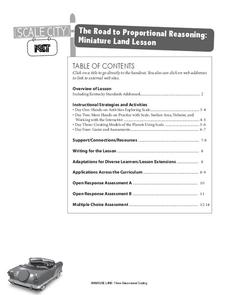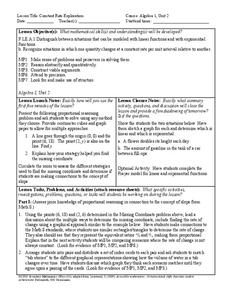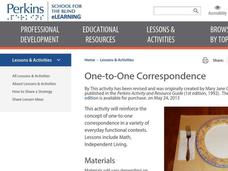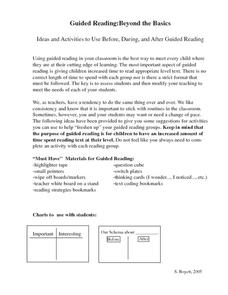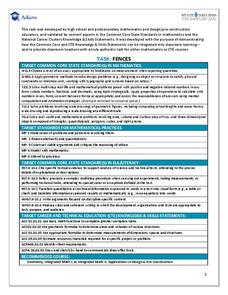Curated OER
The Water Cycle
Observe the stages of the water cycle by completing 3 activities. To help understanding of the water cycle your students can observe evaporation, the formation of frost, vapor and water and the process of distillation which is used to...
Curated OER
Nothing But Problems
Here is a fabulous lesson on problem solving in the mathematical world. In it, third and fourth graders get lots of great coaching on how to approach word problems, and how to best find a solution. They watch an episode of Reading...
Alabama Learning Exchange
Finding Prime
Fifth and sixth graders explore prime numbers. They work with a partner to build rectangular arrays using twelve tiles. Factor pairs are noted and recorded on graph paper. Pupils construct rectangular arrays with a prime number and...
Curated OER
Is Bigger Always Better?
Explore rational numbers with the young mathematicians in your class. They will investigate decimals, fractions, and percents before ordering and comparing rational numbers. This multi-day unit includes differentiation activities and...
Mathematics Vision Project
Module 5: Modeling with Geometry
Solids come in many shapes and sizes. Using geometry, scholars create two-dimensional cross-sections of various three-dimensional objects. They develop the lesson further by finding the volume of solids. The module then shifts to finding...
West Contra Costa Unified School District
Adding by finding 10's
Count with ten frames in a first grade addition lesson. Kids determine how to identify numbers on a number line, as well as with ten frames, and complete ten frames to show their answers in several addition problems.
National Security Agency
Awesome Area - Geometry and Measurement
Break out those math manipulatives, it's time to teach about area! Capturing the engagement of young mathematicians, this three-lesson series supports children with learning how to measure the area of squares, rectangles, and other...
Curated OER
I Have a Magic Pot
Pupils will explore numbers rules. They will create a picture of their rule and exchange their paper with a classmate. The classmate works to figure out the rule. They then share with each other how they found the rule. Questions are...
PBS
Arguing over Area
With the help of the Area Officers and Perimeter Patrol, you learners will develop a better understanding of area and its relationship to perimeter. First, they view a video clip from Cyberchase, and then they visit a website to test...
Curated OER
Equivalent Fraction Paper Strips
Young learners compare the relative values of fractions by making physical representations. They fold and label strips of paper that are equal in length to represent "one whole" and the equal parts that fractions represent. Also, they...
Curated OER
Finding Equal Groups
Build counting fluency in your kindergartners with this counting and grouping timed learning game. Provide various groups of objects to count such as a clear plastic bag filled with 7 beans or a cup with 5 pennies. There are many other...
Oregon Department of Education
Building Number Sense
It's never too early to begin a child's math education. This collection of fun hands-on activities engage youngsters in building their number sense as they learn how to count objects, identify numerals, compare amounts, and much more.
Kentucky Educational Television
The Road to Proportional Reasoning
Just how big would it really be? Young mathematicians determine if different toys are proportional and if their scale is accurate. They solve problems relating scale along with volume and surface area using manipulatives. The last day of...
EduGAINs
Ratio and Proportion
Do these items have the same ratio? Through a learning contract, pupils master proportions by practicing proportions via word problems, graphs, and with manipulatives. An exit ticket checks for understanding at the end of the...
Howard County Schools
Constant Rate Exploration
Question: What do rectangles and bathtub volume have in common? Answer: Linear equations. Learn how to identify situations that have constant rates by examining two different situations, one proportional and one not proportional.
Curated OER
Chances Are......You're Right
Young mathematicians study probability. In this math lesson, learners calculate odds, and convert those into percentages of probability. Fractions are also used, making this lesson quite rich in some of the more difficult conversions...
Curated OER
Poly-Mania
This hands-on lesson takes young geometers on a tour of 2D polygons and 3D polyhedrons. After exploring different web resources and discussing geometric shapes, small groups construct models of polyhedrons using bendable straws. Note:...
Curated OER
An Introduction To Volume
Upper graders explore the topic of volume. In this math lesson plan, pupils count volume in cubic units, multiply to find volume, estimate volume, write a multiplication sentence to find the volume, and make a cost analysis of different...
Perkins School for the Blind
One-to-One Correspondence
Here is an interesting way to build concept understanding regarding one-to-one correspondence. Learners with visual impairments will use an array of everyday objects in context to foster an understanding of what one-to-one correspondence...
Ideas From Suzi
Guided Reading: Beyond the Basics
Elevate children's reading comprehension skills with this collection of guided reading resources. From paper dice with basic comprehension questions printed on them to a system for using sticky notes to identify key parts of a story,...
Achieve
Fences
Pupils design a fence for a backyard pool. Scholars develop a fence design based on given constraints, determine the amount of material they need, and calculate the cost of the project.
EduGAINs
Solving Linear Equations
To find x, you have to get it by itself, correct? Individuals solve a linear word problem and share their solutions with others that solved the problem in a similar fashion. They then complete a self-assessment on how they feel about...
California Education Partners
Yum Yum Cereal
Design an efficient cereal box. Scholars use set volume criteria to design a cereal box by applying their knowledge of surface area to determine the cost to create the box. They then determine whether their designs will fit on shelves,...
101 Questions
Dandy Candies
Package design is an economic necessity. Young scholars assume the role in an interesting inquiry-based lesson. Given 24 cubic shaped candies to package, they must determine the arrangement that uses the least amount of cardboard to...
Other popular searches
- Cubing Strategy Math
- Cubing Strategy for Science
- Lesson Plan Cubing Strategy
- Cubing Strategy Lesson Plans



